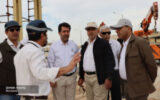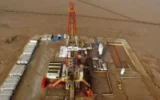
According to OPEC, the average price of Iranian heavy oil in 2025 fell by more than $10 compared to last year, reaching $70.7; a trend similar to the OPEC oil basket, which has fallen by 30% over the last three years.

Referring to Article 15 of the Seventh Plan Law, Sajjad Khalili emphasized that without changing the financial rules and increasing the actual share of the National Oil Company, it is not possible to maintain production levels and achieve development goals.

Hamid Board emphasized at the ceremony honoring structural engineering and information technology managers that proper organization and decision-making based on current knowledge are the main solutions for solving employee issues and improving the quality of work.

According to an exclusive report by Energy Press, the refining industry entered the second half of the year in October 1404 with a slow setback and without significant jumps. This trend was repeated last month, and two refineries in Tehran and Bandar Abbas had a decrease in production. On the one hand, some refineries were able to maintain the improvement trend in monthly production and sales.

The CEO of the Central Iranian Oil Company announced: "In the first half of this year, the company was able to successfully implement its commitments in the field of gas production and gas storage in the Shurijeh and Sarajeh reservoirs."

The Director of Coordination and Supervision of Production at the National Iranian Gas Company announced that with the successful completion of major repairs to refineries and more gas storage than last year, a daily injection capacity of 850 to 860 million cubic meters of gas has been provided to the national network, and a stable supply of winter fuel for the country has been guaranteed.

With the successful completion of major repairs in operational areas and equipment preparation, the Southern Zagros Oil and Gas Exploitation Company announced that it will produce about 162 million cubic meters of gas, 17,000 barrels of oil, and 48,000 barrels of gas condensate daily during the cold season, playing its strategic role in providing the country with sustainable energy.

Alireza Mahdavi, CEO of Bushehr Petrochemical Company, announced the start of the launch of Bushehr Petrochemical Company's olefin unit.

The CEO of Arvandan Oil and Gas Company said: In the South Azadegan field, a plan was implemented to separate low-pressure wells from high-pressure wells and improve the flow conditions of oil pipelines to optimize and increase production, which led to an increase in production in this field of 8,500,000 barrels.

The Deputy Managing Director of the National Iranian Drilling Company for Drilling Projects said: "The National Iranian Drilling Company, by allocating and deploying eight heavy onshore drilling rigs in five provinces of the country, within the framework of cooperation with the Central Iranian Oil Company, is actively participating in the drilling and completion of oil and gas wells and increasing the volume of gas production in the country."










